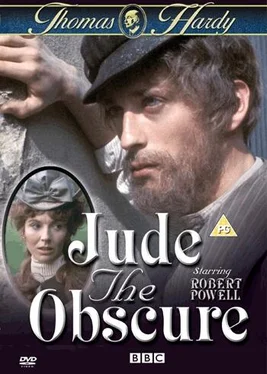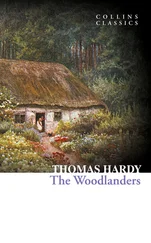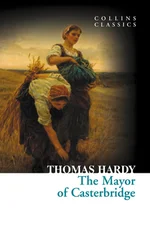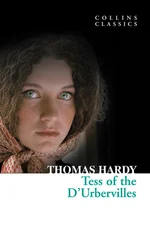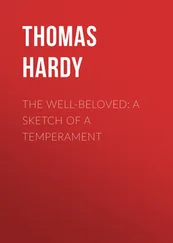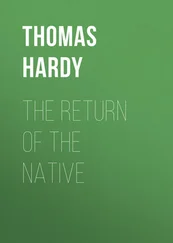"Oh, I say—how jolly! I'm glad I've come," said Arabella. "And—it can't hurt my husband—my being away."
On the opposite side of the river, on the crowded barges, were gorgeous nosegays of feminine beauty, fashionably arrayed in green, pink, blue, and white. The blue flag of the boat club denoted the centre of interest, beneath which a band in red uniform gave out the notes she had already heard in the death-chamber. Collegians of all sorts, in canoes with ladies, watching keenly for "our" boat, darted up and down. While she regarded the lively scene somebody touched Arabella in the ribs, and looking round she saw Vilbert.
"That philtre is operating, you know!" he said with a leer. "Shame on 'ee to wreck a heart so!"
"I shan't talk of love to-day."
"Why not? It is a general holiday."
She did not reply. Vilbert's arm stole round her waist, which act could be performed unobserved in the crowd. An arch expression overspread Arabella's face at the feel of the arm, but she kept her eyes on the river as if she did not know of the embrace.
The crowd surged, pushing Arabella and her friends sometimes nearly into the river, and she would have laughed heartily at the horse-play that succeeded, if the imprint on her mind's eye of a pale, statuesque countenance she had lately gazed upon had not sobered her a little.
The fun on the water reached the acme of excitement; there were immersions, there were shouts: the race was lost and won, the pink and blue and yellow ladies retired from the barges, and the people who had watched began to move.
"Well—it's been awfully good," cried Arabella. "But I think I must get back to my poor man. Father is there, so far as I know; but I had better get back."
"What's your hurry?"
"Well, I must go… Dear, dear, this is awkward!"
At the narrow gangway where the people ascended from the riverside path to the bridge the crowd was literally jammed into one hot mass—Arabella and Vilbert with the rest; and here they remained motionless, Arabella exclaiming, "Dear, dear!" more and more impatiently; for it had just occurred to her mind that if Jude were discovered to have died alone an inquest might be deemed necessary.
"What a fidget you are, my love," said the physician, who, being pressed close against her by the throng, had no need of personal effort for contact. "Just as well have patience: there's no getting away yet!"
It was nearly ten minutes before the wedged multitude moved sufficiently to let them pass through. As soon as she got up into the street Arabella hastened on, forbidding the physician to accompany her further that day. She did not go straight to her house; but to the abode of a woman who performed the last necessary offices for the poorer dead; where she knocked.
"My husband has just gone, poor soul," she said. "Can you come and lay him out?"
Arabella waited a few minutes; and the two women went along, elbowing their way through the stream of fashionable people pouring out of Cardinal meadow, and being nearly knocked down by the carriages.
"I must call at the sexton's about the bell, too," said Arabella. "It is just round here, isn't it? I'll meet you at my door."
By ten o'clock that night Jude was lying on the bedstead at his lodging covered with a sheet, and straight as an arrow. Through the partly opened window the joyous throb of a waltz entered from the ball-room at Cardinal.
Two days later, when the sky was equally cloudless, and the air equally still, two persons stood beside Jude's open coffin in the same little bedroom. On one side was Arabella, on the other the Widow Edlin. They were both looking at Jude's face, the worn old eyelids of Mrs. Edlin being red.
"How beautiful he is!" said she.
"Yes. He's a 'andsome corpse," said Arabella.
The window was still open to ventilate the room, and it being about noontide the clear air was motionless and quiet without. From a distance came voices; and an apparent noise of persons stamping.
"What's that?" murmured the old woman.
"Oh, that's the doctors in the theatre, conferring honorary degrees on the Duke of Hamptonshire and a lot more illustrious gents of that sort. It's Remembrance Week, you know. The cheers come from the young men."
"Aye; young and strong-lunged! Not like our poor boy here."
An occasional word, as from some one making a speech, floated from the open windows of the theatre across to this quiet corner, at which there seemed to be a smile of some sort upon the marble features of Jude; while the old, superseded, Delphin editions of Virgil and Horace, and the dog-eared Greek Testament on the neighbouring shelf, and the few other volumes of the sort that he had not parted with, roughened with stone-dust where he had been in the habit of catching them up for a few minutes between his labours, seemed to pale to a sickly cast at the sounds. The bells struck out joyously; and their reverberations travelled round the bed-room.
Arabella's eyes removed from Jude to Mrs. Edlin. "D'ye think she will come?" she asked.
"I could not say. She swore not to see him again."
"How is she looking?"
"Tired and miserable, poor heart. Years and years older than when you saw her last. Quite a staid, worn woman now. 'Tis the man—she can't stomach un, even now!"
"If Jude had been alive to see her, he would hardly have cared for her any more, perhaps."
"That's what we don't know… Didn't he ever ask you to send for her, since he came to see her in that strange way?"
"No. Quite the contrary. I offered to send, and he said I was not to let her know how ill he was."
"Did he forgive her?"
"Not as I know."
"Well—poor little thing, 'tis to be believed she's found forgiveness somewhere! She said she had found peace!
"She may swear that on her knees to the holy cross upon her necklace till she's hoarse, but it won't be true!" said Arabella. "She's never found peace since she left his arms, and never will again till she's as he is now!"
***END OF JUDE THE OBSCURE***
William Barnes.
Drayton.
